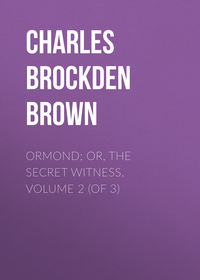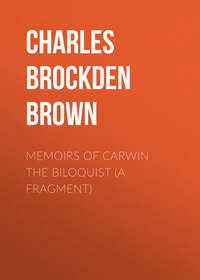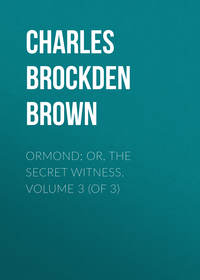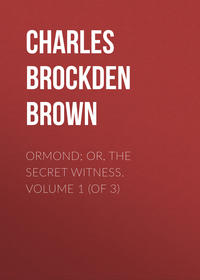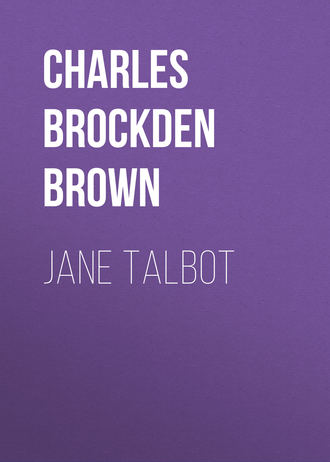 полная версия
полная версияJane Talbot
I now produced the letter I received from Hannah Seeker, and said, "I see, madam, you will compel me to preserve no measures with you. There is a letter which you wrote to Mrs. Fielder. Its contents were so important that you would not at first trust a servant with the delivery of it at the office. This, however, you were finally compelled to do. A fellow-servant, however, stole it from your messenger, and, instead of being delivered according to its address, it has lately come into my hands.
"No doubt," (showing the superscription, but not permitting her to see that the seal was unbroken,) "no doubt you recognise the hand; the hand of that anonymous detractor who had previously taken so much pains to convince the husband that his wife was an adulteress and a prostitute."
Had I foreseen the effect which this disclosure would have had, I should have hesitated. After a few convulsive breathings, she fainted. I was greatly alarmed, and, calling in a female servant, I stayed till she revived. I thought it but mercy to leave her alone, and, giving directions to the servant where I might be found, and requesting her to tell her mistress that I would call again early in the morning, I left the house.
I returned hither, and am once more shut up in my solitary chamber. I am in want of sleep, but my thoughts must be less tumultuous before that blessing can be hoped for. All is still in the house and in the city, and the "cloudy morning" of the watchman tells me that midnight is past. I have already written much, but must write on.
What, my friend, can this letter contain? The belief that the contents are known and the true writer discovered produced strange effects. I am afraid there was some duplicity in my conduct. But the concealment of the unbroken seal was little more than chance. Had she inquired whether the letter was opened, I should not have deceived her.
Perhaps, however, I ascribe too much to this discovery. Miss Jessup was evidently very ill. The previous conversation had put her fortitude to a severe test. The tide was already so high, that the smallest increase sufficed to overwhelm her. Methinks I might have gained my purpose with less injury to her.
But what purpose have I gained? I have effected nothing; I am as far, perhaps further than ever from vanquishing her reluctance. A night's reflection may fortify her pride, may furnish some expedient for eluding my request. Nay, she may refuse to see me when I call on the morrow, arid I cannot force myself into her presence.
If all this should happen, what will be left for me to do? That deserves some consideration. This letter of Miss Jessup's may possibly contain the remedy for many evils. What use shall I make of it? How shall I get at its contents?
There is but one way. I must carry it to Mrs. Fielder, and deliver it to her, to whom it is addressed. Carry it myself? Venture into her presence by whom I am so much detested? She will tremble with mingled indignation and terror at the sight of me. I cannot hope a patient audience. And can I, in such circumstances, rely on my own equanimity? How can I endure the looks of one to whom I am a viper, a demon; who, not content with hating me for that which really merits hatred, imputes to me a thousand imaginary crimes?
Such is the lot of one that has forfeited his reputation. Having once been guilty, the returning path to rectitude is forever barred against him. His conduct will almost always be liable to a double construction; and who will suppose the influence of good motives, when experience has proved the influence, in former cases, of evil ones?
Jane Talbot is young, lovely, and the heiress, provided she retain the favour of her adopted mother, of a splendid fortune. I am poor, indolent, devoted, not to sensual, but to visionary and to costly, luxuries. How shall such a man escape the imputation of sordid and selfish motives?
How shall he prove that he counterfeits no passion, employs no clandestine or illicit means, to retain the affections of such a woman. Will his averments of disinterested motives be believed? Why should they be believed? How easily are assertions made, and how silly to credit declarations contradicted by the tenor of a man's whole conduct!
But I can truly aver that my motives are disinterested. Does not my character make a plentiful and independent provision, of more value to me, more necessary to my happiness than to that of most other men? Can I place my hand upon my heart, and affirm that her fortune has no part in the zeal with which I have cultivated Jane's affections? There are few tenants of this globe to whom wealth is wholly undesirable, and very few whose actual poverty, whose indolent habits, and whose relish for expensive pleasure, make it more desirable than to me.
Mrs. Fielder is averse to her daughter's wishes. While this aversion endures, marriage, instead of enriching me, will merely reduce my wife to my own destitute condition. How are impartial observers, how is Mrs. Fielder, to construe my endeavours to subdue this aversion, and my declining marriage till this obstacle is overcome? Will they ascribe it merely to reluctance to bereave the object of my love of that affluence and those comforts without which, in my opinion, she would not be happy? Yet this is true. My own experience has taught me in what degree a luxurious education endears to us the means of an easy and elegant subsistence. Shall I be deaf to this lesson? Shall I rather listen to the splendid visions of my friend, who thinks my love will sufficiently compensate her for every suffering,–who seems to hold these enjoyments in contempt, and describes an humble and industrious life as teeming with happiness and dignity?
These are charming visions. My heart is frequently credulous, and is almost raised, by her bewitching eloquence, to the belief that, by bereaving her of friends and property, I confer on her a benefit. I place her in a sphere where all the resources of her fortitude and ingenuity will be brought into use.
But this, with me, is only a momentary elevation. More sober views are sure to succeed. Yet why have I deliberately exhorted Jane to become mine? Because I trust to the tenderness of her mother. That tenderness will not allow her wholly to abandon her beloved child, who has hitherto had no rival, and is likely to have no successor in her love. The evil, she will think, cannot be repaired; but some of its consequences may be obviated or lightened. Intercession and submission shall not be wanting. Jane will never suffer her heart to be estranged from her mother. Reverence and gratitude will always maintain their place. And yet, confidence is sometimes shaken; doubts insinuate themselves. Is not Mrs. Fielder's temper ardent and inflexible? Will her anger be so easily appeased? In a contest like this, will she allow herself to be vanquished? And shall I, indeed, sever hearts so excellent? Shall I be the author of such exquisite and lasting misery to a woman like Mrs. Fielder? and shall I find that misery compensated by the happiness of her daughter? What pure and unmingled joy will the daughter taste, while conscious of having destroyed the peace, and perhaps hastened the end, of one who, with regard to her, has always deserved and always possessed a gratitude and veneration without bounds? And for whom is the tranquillity and affection of the mother to be sacrificed? For me,–a poor, unworthy wretch; deservedly despised by every strenuous and upright mind; a fickle, inconsiderate, frail mortal, whose perverse habits no magic can dissolve.
No. My whole heart implores Jane to forget and abandon me; to adhere to her mother; since no earthly power and no length of time will change Mrs. Fielder's feelings with regard to me; since I shall never obtain, as I shall never deserve, her regard, and since her mother's happiness is, and ought to be, dearer to Jane than her own personal and exclusive gratification. God grant that she may be able to perform, and cheerfully perform, her duty!
But how often, my friend, have I harped on this string! Yet I must write, and I must put down my present thoughts, and these are the sentiments eternally present.
Letter XLIV
To Henry ColdenPhiladelphia, December 1.
I said I would not write to you again; I would encourage, I would allow of, no intercourse between us. This was my solemn resolution and my voluntary and no less solemn promise; yet I sit down to abjure this vow, to break this promise.
What a wretch am I! Feeble and selfish beyond all example among women! Why, why was I born, or why received I breath in a world and at a period, with whose inhabitants I can have no sympathy, whose notions of rectitude and decency find no answering chord in my heart?
Never was a creature so bereft of all dignity, all steadfastness. The slave of every impulse; blown about by the predominant gale; a scene of eternal fluctuation.
Yesterday my mother pleaded. Her tears dropped fast into my bosom, and I vowed to be all she wished; not merely to discard you from my presence, but to banish even your image from my thoughts. To act agreeably to her wishes was not sufficient. I must feel as she would have me feel. My actions must flow, not merely from a sense of duty, but from fervent inclination.
I promised every thing. My whole soul was in the promise. I retired to pen a last letter to you, and to say something to your father. My heart was firm; my hand steady. My mother read and approved:–"Dearest Jane! Now, indeed, are you my child. After this I will not doubt your constancy. Make me happy, by finding happiness in this resolution."
"Oh," thought I, as I paced my chamber alone, "what an ample recompense for every self-denial, for every sacrifice, are thy smiles, my maternal friend! I will live smilingly for thy sake, while thou livest. I will live only to close thy eyes, and then, as every earthly good has been sacrificed at thy bidding, will I take the pillow that sustained thee when dead, and quickly breathe out upon it my last sigh."
My thoughts were all lightsome and serene. I had laid down, methought, no life, no joy, but my own. My mother's peace, and your peace, for the safety of either of whom I would cheerfully die, had been purchased by the same act.
How did I delight to view you restored to your father's house! I was still your friend, though invisible. I watched over you, in quality of guardian angel. I etherealized myself from all corporeal passions. I even set spiritual ministers to work to find one worthy of succeeding me in the sacred task of making you happy. I was determined to raise you to affluence, by employing, in a way unseen and unsuspected by you, those superfluities which a blind and erring destiny had heaped upon me.
And whither have these visions flown? Am I once more sunk to a level with my former self? Once I thought that religion was a substance with me,–not a shadow, to flit, to mock, and to vanish when its succour was most needed; yet now does my heart sink.
Oh, comfort me, my friend! plead against yourself; against me. Be my mother's advocate. Fly away from these arms that clasp you, and escape from me, even if your flight be my death. Think not of me, but of my mother, and secure to her the consolation of following my unwedded corpse to the grave, by disclaiming, by hating, by forgetting, the unfortunate
JANE.
Letter XLV
To Henry ColdenDecember 4.
Ah, my friend! in what school have you acquired such fatal skill in tearing the heart of an offender? Why, under an appearance of self-reproach, do you convey the bitterest maledictions? Why, with looks of idolatry and accents of compassion., do you aim the deadliest contempts and hurl the keenest censures against me?
"You acquit me of all shadow of blame." What! in proving me fickle, inconsistent, insensible to all your merit, ungrateful for your generosity, your love? How have I rewarded your reluctance to give me pain, your readiness to sacrifice every personal good for my sake? By reproaching you with dissimulation. By violating all those vows, which no legal ceremony could make more solemn or binding, and which the highest, earliest, and most sacred voice of Heaven has ordained shall supersede all other bonds. By dooming you to feel "an anguish next to despair." Thus have I requited your unsullied truth, your unlimited devotion to me!
By what degrading standard do you measure my enjoyments! "In my mother's tenderness and gratitude; in the affluence and honour which her regard will secure to me," am I to find consolation for unfaithfulness to my engagements; for every evil that may befall you. You, whom every hallowed obligation, every principle of human nature, has placed next to myself; whom it has become not a fickle inclination, but a sacred duty, to prefer to all others; whose happiness ought to be my first and chief care, and from whose side I cannot sever myself without a guilt inexpiable!
Ah, cruel friend! You ascribe my resolution to a disinterested regard to your good. You wish me to find happiness in that persuasion. Yet you leave me not that phantom for a comforter. You convict me, in every line of your letter, of selfishness and folly. The only consideration that has irresistible weight with me–the restoration of your father's kindness–you prove to be a mere delusion, and destroy it without mercy!
Can you forgive me, Henry? Best of men! Will you be soothed by my penitence for one more rash and inconsiderate act? But, alas! my penitence is rapid and sincere; but where is the merit of compunction that affords no security against the repetition of the fault? And where is my safety?
Fly to me. Save me from my mother's irresistible expostulations. I cannot–cannot withstand her tears. Let me find in your arms a refuge from them. Let me no more trust a resolution which is sure to fail. By making the tie between us such as even she will allow to be irrevocable, by depriving me of the power of compliance, only can I be safe.
Fly to me, therefore. Be at the front-door at ten this night. My Molly will be my only companion. Be the necessary measures previously taken, that no delay or disappointment may occur. One half-hour and the solemn rite may be performed. My absence will not be missed, as I return immediately. Then will there be an end to, fluctuation, for repentance cannot undo. Already in the sight of Heaven, at the tribunal of my own conscience, am I thy wife; but somewhat more is requisite to make the compact universally acknowledged. This is now my resolve. I shall keep it secret from the rest of the world. Nothing but the compulsion of persuasion can make me waver, and concealment will save me from that, and to-morrow remonstrance and entreaty will avail nothing.
My girl has told me of her interview with you, and where you are to be found. The dawn is not far distant, and at sunrise she carries you this. I shall expect an immediate and (need I add, when I recollect the invariable counsel you have given me?) a compliant answer.
And shall I–Let me, while the sun lingers, still pour out my soul on this paper; let me indulge a pleasing, dreadful thought--Shall I, ere circling time bring back this hour, become thy–
And shall my heart, after its dreadful languors, its excruciating agonies, know once more a rapturous emotion? So lately sunk into despondency; so lately pondering on obstacles that rose before me like Alps and menaced eternal opposition to my darling projects; so lately the prey of the deepest anguish: what spell diffuses through my frame this ravishing tranquillity?
Tranquillity, said I? That my throbbing heart gainsays. You cannot see me just now, but the palpitating heart infects my fingers, and the unsteady pen will speak to you eloquently.
I wonder how far sympathy possesses you. No doubt–let me see: ten minutes after four,–no doubt you are sound asleep. Care has fled away to some other head. Those invisible communicants, those aerial heralds whose existence, benignity, and seasonable succour are parts, thou knowest, of my creed, are busy in the weaving of some beatific dream. At their bidding the world of thy fancy is circumscribed by four white walls, a Turkey-carpeted floor, and a stuccoed ceiling. Didst ever see such before? Was't ever, in thy wakeful season, in the same apartment? Never! And, what is more, and which I desire thee to note well, thou art not hereafter to enter it except in dreams.
A poor taper burns upon the toilet,–just bright enough to give the cognizance of something in woman's shape and in negligent attire scribbling near it. Thou needst not tap her on the shoulder; she need not look up and smile a welcome to the friendly vision. She knows that thou art here; for is not thy hand already in hers, and is not thy cheek already wet with her tears? for thy poor girl's eyes are as sure to overflow with joy as with sorrow.
And will it be always thus, my dear friend? Will thy love screen me forever from remorse? will my mother's reproaches never intrude amidst the raptures of fondness and poison my tranquillity?
What will she say when she discovers the truth? My conscience will not allow me to dissemble. It will not disavow the name or withhold the duties of a wife. Too well do I conceive what she will say,–how she will act.
I need not apprehend expulsion from her house. Exile will be a voluntary act:–"You shall eat, drink, lodge, and dress as well as ever. I will not sever husband from wife, and I find no pleasure in seeing those whom I most hate perishing with want. I threatened to abandon you, merely because I would employ every means of preventing your destruction; but my revenge is not so sordid as to multiply unnecessary evils on your head. I shall take from you nothing but my esteem,–my affection,–my society. I shall never see you but with agony; I shall never think of you without pain. I part with you forever, and prepare myself for that grave which your folly and ingratitude have dug for me.
"You have said, Jane, that, having lost my favour, you will never live upon my bounty. That will be an act of needless and perverse cruelty in you. It will be wantonly adding to that weight with which you have already sunk me to the grave. Besides, I will not leave you an option. While I live, my watchful care shall screen you from penury in spite of yourself. When I die, my testament shall make you my sole successor. What I have shall be yours,–at least, while you live.
"I have deeply regretted the folly of threatening you with loss of property. I should have known you better than to think that a romantic head like yours would find any thing formidable in such deprivations. If other considerations were feeble, this would be chimerical.
"Fare you well, Jane, and, when you become a mother, may your tenderness never be requited by the folly and ingratitude which it has been my lot to meet with in the child of my affections!"
Something like this has my mother already said to me, in the course of an affecting conversation, in which I ventured to plead for you. And have I, then, resolved to trample on such goodness?
Whither, my friend, shall I fly from a scene like this? Into thy arms? And shall I find comfort there? can I endure life, with the burden of remorse which generosity like this will lay upon me?
But I tell you, Henry, I am resolved. I have nothing but evil to choose. There is but one calamity greater than my mother's anger. I cannot mangle my own vitals. I cannot put an impious and violent end to my own life. Will it be mercy to make her witness my death? and can I live without you? If I must be an ingrate, be her and not you the victim. If I must requite benevolence with malice and tenderness with hatred, be it her benevolence and tenderness, and not yours, that are thus requited.
Once more, then, note well. The hour of ten; the station near the door; a duly-qualified officiator previously engaged; and my destiny in this life fixed beyond the power of recall. The bearer of this will bring back your answer. Farewell. Remember.
J. TALBOT.
Letter XLVI
To James MontfordDecember 9.
Once more, after a night of painful musing or troubled repose, I am at the pen. I am plunged into greater difficulties and embarrassments than ever.
It was scarcely daylight, when a slumber into which I had just fallen was interrupted by a servant of the inn. A girl was below, who wanted to see me. The description quickly proved it to be Molly. I rose and directed her to be admitted.
She brought two letters from her mistress, and was told to wait for an answer. Jane traversed her room, half distracted and sleepless during most of the night. Towards morning she sat down to her desk, and finished a letter, which, together with one written a couple of days before, was despatched to me.
My heart throbbed–I was going to say with transport; but I am at a loss to say whether anguish or delight was uppermost on reading these letters. She recalls every promise of eternal separation; she consents to immediate marriage as the only wise expedient; proposes ten o'clock this night to join our hands; will conceal her purpose from her mother, and resigns to me the providing of suitable means.
I was overwhelmed with surprise and–shall I not say?–delight at this unexpected concession. An immediate and consenting answer was required. I hurried to give this answer, but my tumultuous feelings would not let me write coherently. I was obliged to lay down the pen, and take a turn across the room to calm my tremors. This gave me time to reflect.
"What," thought I, "am I going to do? To take advantage of a momentary impulse in my favour. To violate my promises to Mrs. Fielder: my letter to her may be construed into promises not to seek another interview with Jane, and to leave the country forever. And shall I betray this impetuous woman into an irrevocable act, which her whole future life may be unavailingly consumed in repenting? Some delay, some deliberation, cannot be injurious.
"And yet this has always been my advice. Shall I reject the hand that is now offered me? How will she regard these new-born scruples, this drawing back when the door spontaneously opens and solicits my entrance?
"Is it in my power to make Jane Talbot mine? my wife? And shall I hesitate? Ah! would to Heaven it were a destiny as fortunate for her as for me!–that no tears, no repinings, no compunctions, would follow! Should I not curse the hour of our union when I heard her sighs? and, instead of affording consolation under the distress produced by her mother's displeasure, should I not need that consolation as much as she?"
These reflections had no other effect than to make me irresolute. I could not return my assent to her scheme, I could not reject so bewitching an offer. This offer was the child of a passionate, a desperate moment. Whither, indeed, should she fly for refuge from a scene like that which she describes?
Molly urged me to come to some determination, as her mistress would impatiently wait her return. Finding it indispensable to say something, I at length wrote:–
"I have detected the author of the forgery which has given us so much disquiet. I propose to visit your mother this morning, when I shall claim admission to you. In that interview may our future destiny be discussed and settled. Meanwhile, still regard me as ever ready to purchase your true happiness by every sacrifice."
With this billet Molly hastened away. What cold, repulsive terms were these! My conscience smote me as she shut the door. But what could I do?
I had but half determined to seek an interview with Mrs. Fielder. What purpose would it answer while the truth respecting the counterfeit letter still remained imperfectly discovered? And why should I seek an interview with Jane? Would her mother permit it? and should I employ my influence to win her from her mother's side or rivet her more closely to it?
What, my friend, shall I do? You are too far off to answer me, and you leave me to my own destiny. You hear not, and will not seasonably hear what I say. Today will surely settle all difficulties, one way or another. This night, if I will, I may be the husband of this angel, or I may raise obstacles insuperable between us. Our interests and persons may be united forever, or we may start out into separate paths and never meet again.


